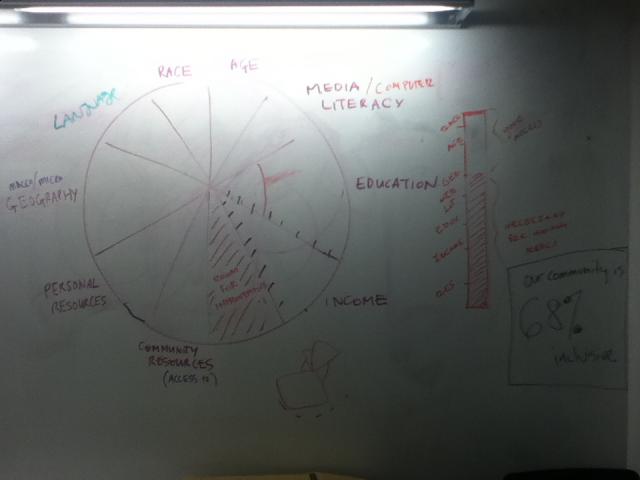Last week heralded my first class in CMS.360, and I loved it. Even though everyone else in the class seems much more well informed than me, I feel that’s a great thing. I have no reason to attend college and take this course if I already knew about Civic Media. During my first class, we developed a model for digital inclusion (which we called the Pie). Admittedly, it is still a work of progress. We were experimenting with the idea of quantifying a level of digital inclusion, but for factors such as gender or race, it would be pretty difficult. Still, it was an enlightening experience to be able to create such a model with my fellow classmates. Our group’s idea was to create a pie chart that was divided up into various aspects of digital inclusion, such as race, gender, education and income. Our idea was to fill in the chart based on the aforementioned aspects; the greater the pie, the more digital inclusion was present.
I hail from suburban Texas, from a upper-middle class family. As a result, digital inclusion is not a problem in the hometown I grew up in. I want to take note, however, that as I grew older and moved to different environments, my own Pie has grown tremendously over my lifetime! I was born in urban China, where my ancestors have lived for centuries. It is without a doubt that the environment I spent my early childhood years has very little digital inclusion. Although, internet usage is currently skyrocketing in China, the “helicopter parent” government of the Peoples’ Republic continues to filter key elements required for the potential digital democracy of the World Wide Web. The combined financial, technological, and governmental barriers of China in the 90’s means that the Chinese Pie would be mostly empty. If I had stayed in the Peoples’ Republic, my own Pie would be about the size of a cupcake. Perhaps increasing digital inclusion in China (especially rural areas nowadays) would be an interesting civic media project.
Realizing how digitally inclusive my American hometown is, I feel grateful for what I have right now. In the rush of school, work, sports, and other activities at MIT, I haven’t really stopped and enjoyed the present. For me, it is always about the future, the future, the future! Maybe I should just pause for a little while and think about how privileged it is to be an educated college student. I have so many digital resources available to me, I fail to fully take advantage of my potential digital inclusiveness. All of the resources available to me, from lightening fast internet to a network of brilliant individuals, can be put to great use. If MIT could be related to information ecology, this place would be the Garden of Eden! Of course, that is the reason why I am taking this course. I wish to be enlightened of the resources available to me. I wish to learn of the unlimited potential for digital inclusiveness of my current environment.

